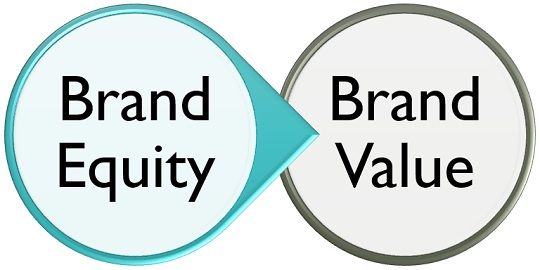 A brand is not just a name, logo, design, symbol or combination of them, that helps the consumer in identifying the origin of the product, but it is much more than that. A brand is a promise, feeling, expectation and experience. A point to ponder, relating to the brand is that Brand equity is not equal to brand value. Brand equity is consumer focused, as its value is derived from consumer’s perceptions, experiences, memories and associations concerning the brand.
A brand is not just a name, logo, design, symbol or combination of them, that helps the consumer in identifying the origin of the product, but it is much more than that. A brand is a promise, feeling, expectation and experience. A point to ponder, relating to the brand is that Brand equity is not equal to brand value. Brand equity is consumer focused, as its value is derived from consumer’s perceptions, experiences, memories and associations concerning the brand.
On the other hand, brand value is something that decides the monetary value created by the brand for the company in the market.
Brand Equity isn’t inbuilt, it is created or developed by the company over a period of time, through their products, which are not easily replaceable. Indeed, the brand is recognized as the second name for the item itself, because of the quality and reliability. As against, Brand value is an important element for the measurement of goodwill and the value of the company.
Content: Brand Equity Vs Brand Value
Comparison Chart
| Basis for Comparison | Brand Equity | Brand Value |
|---|---|---|
| Meaning | Brand Equity is the worth of the brand that a firm earns through consumer consciousness of the brand name of the specific product, instead of the product itself. | Brand Value is the economic worth of the brand, wherein the customers are readily willing to pay more for a brand, to get the product. |
| What is it? | Attitude and Willingness of the consumer towards the brand. | Net present value of forecasted cash flows |
| Derived from | Customers | Product and Service Quality, Channel relationships, Availability, Price and Performance, Advertising, etc. |
| Indicates | Success of the brand | Total financial value of the brand. |
Definition of Brand Equity
Brand Equity implies the recall value by which a consumer connects to the product or service of the brand, and that is distinct from the rest of the brands present in the market. In other words, Brand Equity is a combination of the consumer preference, awareness, loyalty and recall value.
Brand Equity is ascertained by consumer behaviour, perception and experiences. It is developed over a period of time, which increases on the basis of the delivery of promises, made by the company to its audience. Hence, it occurs when the consumer is very much accustomed to the brand, as well as they have a very positive cum distinctive brand association.
Brand Equity is said to be positive when consumer are fully satisfied with the product offered under the brand name and in such a way that they use the brand name, as a synonym of the product itself, or the image that pops up in the minds of the consumer when they think of the particular product, such as Dettol for antiseptic lotion, Dalda for hydrogenated vegetable oil, Bisleri for mineral water, etc.
On the other hand, it is said to be negative, when consumers are disappointed with the services and the brand does not fulfil what it says or promises, and so people rather than recommending it to other customers, they advise not to buy such products, or else they won’t be getting value for money. So, when the brand equity is high, customers will not step back, even if the company charges a high price for the same product, as compared to its rivals.
Definition of Brand Value
Brand Value is the net present value of the future cash flows of the brand itself. The brand value can be ascertained by performing marketing and financial analysis, for which the following steps are to be followed:
- Market Segmentation: In the initial step of the process, the market is classified into various mutually exclusive segments, in which the brand is offered for sale, which will assist in determining the disparity among the brand’s different classes of customers.
- Financial Analysis: Interbrand evaluates the purchase price, frequency and volume, so as to compute the exact forecast of the future sales and revenues, of the brand. After arriving at brand revenues, all the associated operating expenses, taxes and charge for capital employed is subtracted, to come up with the Economic Earnings.
- Branding role: A proportion of Economic Earnings assigned to brand in all the market segment by recognizing various demand drivers, and ascertaining the extent to which the brand affects the segments.
- Brand Strength: After ascertaining the role of brand, thereafter Interbrand analyzes the strength of the brand, to know whether the brand will be able to realize the estimated earnings. Competitive benchmarking and a systematic assessment of the commitment, protection, responsiveness, relevance and differentiation, etc. are the base in this step. Thus industry and brand equity data are applied to know the risk premium, which helps in the determination of Brand Discount Rate.
- Brand Valuation: The net present value of the forecasted brand earnings, discounted by Brand Discount Rate amounts to Brand Value. The net present value calculation contains both the forecasted period and the period further, representing the brand’s power in generating revenues in future.
Brand value is the premium endowed to the brand from the customers, who can pay the extra price to get it. It can be achieved by delivering quality products at a competitive price, using state of the art technology for producing the product, excellent customer service, commitment towards social and environmental responsibility. The main steps for creating brand value are:
The brand value is the difference between what a customer pays for getting the branded product, i.e. from the brand point of view, and a similar product without a revered brand name.
So, there are four components, i.e. reputation value, relationship value, experiential value and symbolic value, which together adds to the value of the brand. It is developed through the stories, experiences, associations and image of the brand, for the customer.
Key Differences Between Brand Equity and Brand Value
The points given below are substantial so far as the difference between brand equity and brand value is concerned:
- Brand equity is the value over and above, that a product earns because it is produced under a popular brand name. So, it can be said that it is determined by the value and strength of the brand. On the other hand, Brand Value implies the financial worth of the brand in the market, determined by conducting financial and marketing analysis.
- Brand Equity is the perception and willingness of the consumer with respect to the brand. As against, Brand Value implies the brand’s net present value of the earnings that may arise in future.
- Brand Equity originates from consumer’s recall value, whereas Brand Value is based on the brand’s clarity, differentiation, authenticity, commitment, brand’s clarity, consistency, performance and so forth.
- Brand equity indicates the success of the brand, whereas brand value represents the total financial (sale) value of the brand in the market.
Conclusion
To sum up, we can say that brand value is the end result of brand equity, as brand equity is something that can help in increasing the value of a brand in the market. The variance between the brand value to the consumer and the value of the product without that brand name is brand equity.






Leave a Reply